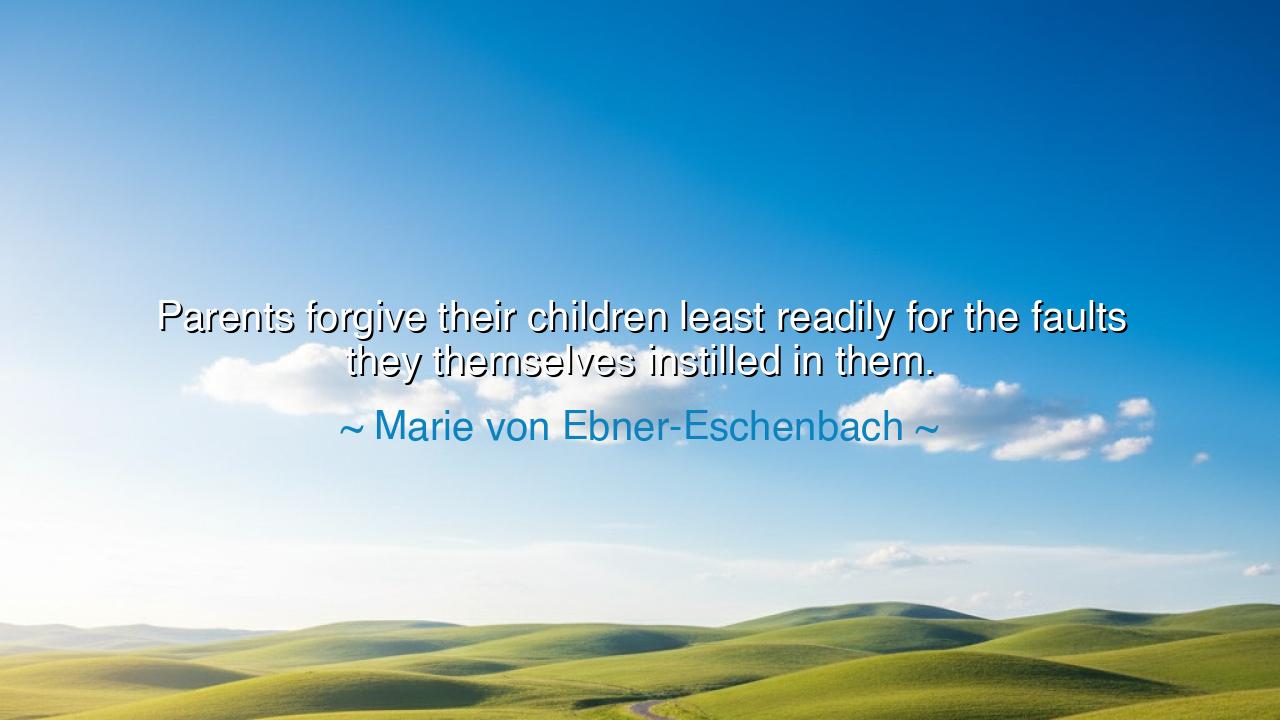
Parents forgive their children least readily for the faults they
Parents forgive their children least readily for the faults they themselves instilled in them.






Marie von Ebner-Eschenbach, the Austrian writer whose pen cut through the illusions of human nature, once wrote: “Parents forgive their children least readily for the faults they themselves instilled in them.” In this sharp and haunting observation lies a mirror for the soul of every mother and father. For she unmasks a truth that many dare not admit: that often the very flaws we despise in our children are but reflections of our own shortcomings, planted by our hands, nurtured by our example, and then resented when they bear fruit.
The meaning of her words is layered with paradox. Parents, who are meant to be the nurturers of patience and forgiveness, often recoil when they see their own weaknesses embodied in their children. A quick temper, a tendency toward stubbornness, a laziness or pride—these are not faults born in isolation but often inherited through years of imitation and influence. The parent, instead of acknowledging their role, grows harsher in judgment, for to forgive the child would be to confront themselves. Thus, resentment arises where compassion should dwell, and the cycle of blame becomes a wall between generations.
History offers us poignant examples. Consider King Lear of Shakespeare’s great tragedy. His vanity and need for affirmation instilled division and manipulation in his daughters. Yet when those same qualities returned to him in their betrayal, he raged in sorrow, blind to the truth that he had sown the seeds of their faults. Only too late did he see the reflection of himself in them. Ebner-Eschenbach’s wisdom reminds us that such blindness is not confined to kings, but is a common thread in families across all time.
The insight also reveals the human struggle with self-recognition. To see one’s weakness mirrored in another is painful; to see it in one’s child is almost unbearable. For the child becomes a living testimony of what the parent has failed to master. It is easier to condemn the child than to confess one’s own guilt. Yet the way of wisdom is not in denial, but in humility—to admit, “This fault is partly mine,” and then to walk the path of healing together. Such humility transforms judgment into understanding, and resentment into redemption.
This truth carries a warning: if parents do not confront their own flaws, they will pass them on, and then despise them when they reappear. The impatient father teaches impatience, the fearful mother teaches fear, and then both are wounded when they see their shadows rise in the lives of their children. The cycle is broken not by harsher correction, but by inner transformation. The parent who masters themselves gives their child not perfection, but an example of growth and honesty.
The lesson for future generations is clear: when you find yourself angered by your child’s faults, pause and ask, “Do I see myself in this?” If the answer is yes, then do not lash out, but instead guide with gentleness, for you are guiding not only them, but the younger version of yourself. Practice forgiveness not only toward your children but toward your own past mistakes. In doing so, you build a bridge rather than a wall, and you teach your child that flaws are not chains but opportunities for growth.
Therefore, let Marie von Ebner-Eschenbach’s words endure as a timeless teaching: do not despise the reflection of your own faults in your children, but use it as a call to humility, compassion, and change. A parent’s greatness is not measured in how perfectly they shaped their child, but in how humbly they continue to shape themselves. For when parents forgive the faults they once carried into their children, they not only heal the child’s heart, but redeem their own.






AAdministratorAdministrator
Welcome, honored guests. Please leave a comment, we will respond soon